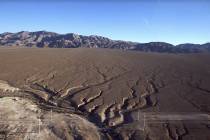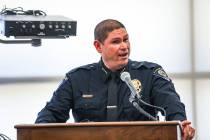Teacher evaluations changing
Nevada will be the first to stride where other states have stumbled, vowed Superintendent of Public Instruction James Guthrie on Thursday, praising the state's sweeping new teacher evaluation system that will use students' grades to rate teachers.
"We want to be the first to get it right," said Guthrie, referencing blunders in Florida, where thousands of evaluations had to be retracted because of miscalculations, and of the Houston Independent School District, which forced teachers to hand back bonuses awarded for performance, also because of miscalculations.
But there's a problem.
The vast majority of Nevada teachers will be evaluated on other teachers' work, not their own, according to the Legislature-created council that spent 15 months building the evaluation system for teachers and principals.
Until now, Nevada teachers have been evaluated based on standards set by individual districts.
Evaluations in Clark County, where 18,000 of the state's 25,000 teachers work, are based entirely on principals who observe teachers in the classroom for at least an hour a year, Chief Human Resources Officer Staci Vesneske said. The end result is a simple "satisfactory" or "unsatisfactory" rating. No student performance data is taken into account, and some believe the system is too subjective, she said.
The Legislature told the Teachers and Leaders Council to make at least 50 percent of teachers' and administrators' evaluations dependent on student performance data. It did just that, making how much students improve annually count for 35 percent of teacher evaluations. Another 10 percent would be based on the reduction of gaps between underperforming students and average students. And 5 percent would be based on the percentage of students with grade-level skills.
All that data would come from state tests.
However, only 25 percent to 30 percent of teachers teach grades three through eight, the classes given state tests in math and English, council chairwoman Pamela Salazar said.
In high school, students must pass the state proficiency exams in reading, writing, math and science. Even then, music, art, physical education and other teachers can't be evaluated for student performance in those subjects.
"We have to be pragmatic about the resources available to us," said council member Rorie Fitzpatrick, who also is Nevada's deputy superintendent of Instructional, Research and Evaluative Services.
She said the council advocates that teachers whose students aren't tested be evaluated using a school's average student scores. "It doesn't mean we should settle for that."
The council argued that testing needs to eventually be expanded, but that will cost money, as will implementing this new evaluation system, which the State Board of Education will consider formally adopting on Jan. 25. The Legislature then must make some changes in state law this session.
Guthrie estimated the new system alone would cost $10 million to $20 million to start. And the Legislature required the evaluations to be put into practice no later than next school year.
That is not enough time to do this right, said Salazar, asking for two trial years before implementing the system in 2015-16.
Guthrie agreed, as did officials from the Clark County Education Association, which bargains for local teachers.
"We don't want to repeat the mistakes of Florida," Salazar said. "We want to make sure that when we stand this up and make decisions based on it, we believe in it, we know it's right."
To do it right, the council recommended a "validation study" be done over the trial years to make sure teachers aren't misevaluated, Fitzpatrick said.
She described the possible scenario of a top-class music teacher in a struggling school being given a bad score because students' test scores schoolwide are low. Or an ineffective music teacher being given a top score because the schools' aggregate test scores are high.
"We can't say lucky you to be in a school where your peers are doing strong work," said Fitzpatrick, noting the fear that good teachers would flee the struggling schools where they're needed most.
That would be even more likely under the new system, which would award bonuses to teachers with high evaluations.
To balance the testing data, the other half of evaluations will be based on teachers' classroom behavior and their actions outside the classroom influencing instruction, likely to be scored by school administrators.
Guthrie called the council's proposed evaluation system "superb" but noted that new faces account for one-third of the state Legislature, which must make changes to state law for this to happen. Who knows what they will do. And they also must set aside an undetermined amount of money in an already cash-strapped state to implement the new system.
But Nevada needs its first-ever teacher evaluation system, he said.
"Professionals need to be evaluated," Guthrie said. "Any person unevaluated is out of control. Physicians, attorneys, engineers, accountants, on and on and on are all evaluated."
Contact reporter Trevon Milliard at
tmilliard@reviewjournal.com or 702-383-0279.

















